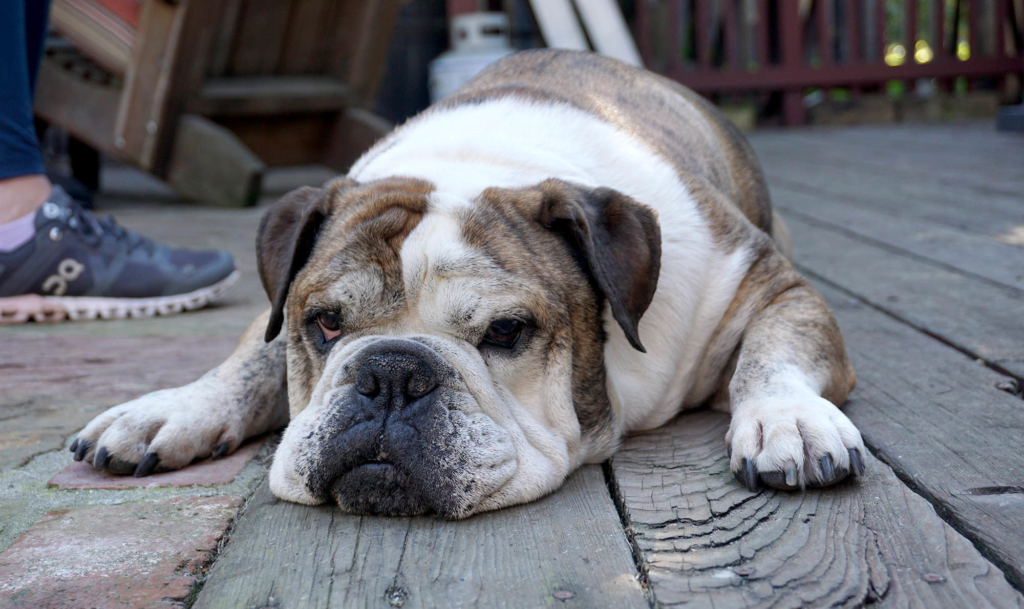Why Do Bulldogs Have an Underbite?

Why Do Bulldogs Have an Underbite?:- In the world of dogs, an underbite—scientifically termed “mandibular prognathism”—occurs when the lower jaw extends beyond the upper jaw, giving Bulldogs their signature “tough guy” look. According to Science Direct, this condition happens when the mandible is longer than the maxilla (undershot), and it’s a common trait in brachycephalic breeds such as Bulldogs, Boxers, and Pekingese.
Can you fix a Bulldog underbite?
If your English Bulldog’s underbite isn’t causing any issues, like difficulty chewing, there’s generally no need to address it. However, if the underbite is severe and causing problems, the first step is to consult your vet. They can assess whether corrective treatment is necessary.

If the vet determines that your English Bulldog’s underbite requires correction, there are several treatment options available:
1. Removing the problematic teeth
2. Surgical intervention to realign the jaw
3. Using an orthodontic appliance
Underbite treatments for English Bulldogs can be costly and invasive, so they should only be pursued if absolutely necessary. Often, these treatments will involve a referral to a veterinary orthodontist or dental specialist.
Care Tips for Bulldogs with Underbites
Regular Vet Checkups: Schedule frequent vet visits to monitor and address any health issues associated with the underbite.
Dental Hygiene: Maintain a consistent dental care routine, including regular brushing and professional checkups, to manage potential complications from the underbite.
Diet and Feeding: Opt for soft food or specially formulated kibble to ensure comfortable eating for Bulldogs with pronounced underbites.
Monitor for Distress: Keep an eye out for any signs of breathing difficulties, especially during physical activity or in hot weather, and consult your vet if any issues arise.

Your Bulldog’s Health
We understand how much you care about your Bulldog’s well-being, which is why we’re here to help you keep her in top shape. We’ve compiled a summary of the key health concerns specific to Bulldogs that we’ll address throughout her life. By being aware of these breed-specific issues, we can create a proactive health plan to monitor and potentially prevent some common risks.
Many health conditions are genetic and linked to your Bulldog’s breed. Canine genetic researchers and veterinarians agree that the issues outlined here are notably prevalent in Bulldogs. This doesn’t mean your dog will definitely face these problems, but it does indicate she has a higher risk compared to other breeds. We’ll cover the most common health concerns you might encounter, giving you a heads-up on what to expect. However, this isn’t an exhaustive list, so if you notice any unusual signs or symptoms, don’t hesitate to reach out to us.
This guide offers essential health information relevant to all dogs, along with specific genetic predispositions for Bulldogs. By understanding these factors, we can work together to address your pet’s unique medical needs. At the end of the guide, you’ll find tips for at-home care to keep your English Bulldog looking and feeling her best. With this knowledge, you’ll be well-equipped to monitor her health, and we’ll all have the confidence that we’re providing the best care possible for your beloved companion.
Signs and Symptoms of an Underbite in French Bulldogs
Difficulty Chewing and Eating
An underbite can make it hard for your French Bulldog to chew and eat effectively. Misaligned teeth may prevent them from breaking down their food properly, leading to slower eating times or noticeable struggles when biting into their meals. If you see your Frenchie taking longer to eat or having trouble handling their food, an underbite could be the cause.

Discomfort or Pain
In more pronounced cases, an underbite may cause your French Bulldog discomfort or pain. This can happen when the misalignment leads to friction or pressure between the teeth or gums. You might notice your dog pawing at their mouth or avoiding certain foods due to this discomfort.
Oral Health Problems
An underbite can also lead to various oral health issues. Misaligned teeth might rub against the soft tissues in the mouth, causing gum irritation, bleeding, or even small cuts. Additionally, bad breath may be a sign that your Frenchie is experiencing oral health problems related to their underbite.
Underbite Treatment
Perfectly aligned teeth are rare; most people have some degree of misalignment. While minor misalignments often don’t need medical intervention, addressing a severe underbite can be highly beneficial.
Correcting an underbite can make it easier to clean your teeth, reducing the risk of tooth decay and gum disease. It also alleviates strain on your teeth, jaws, and facial muscles. This can lower your chances of tooth breakage and alleviate painful symptoms associated with temporomandibular disorders (TMD), which are frequently linked to underbites.
Common treatments for an underbite include:
At-Home Dental Care
Maintaining healthy teeth involves more than just regular brushing and flossing—it also includes routine visits to your dentist for checkups and cleanings. For those with dental issues like an underbite, extra care is essential to prevent further damage and decay.
Brush your teeth twice daily, using fluoride toothpaste, for at least two minutes each time. Focus on thoroughly cleaning along the gumline, as well as the inside, outside, and back surfaces of your teeth. Don’t forget to floss daily in addition to brushing. Schedule dental checkups and cleanings with your dentist at least twice a year to keep your oral health in check.
Medical Treatment
Correcting an underbite and properly aligning teeth typically requires medical treatment. Even in less severe cases, treatment can significantly enhance the appearance of an underbite.
For milder cases, a dentist may use wire or plastic braces or other dental appliances to reposition the teeth. In situations where overcrowding is a factor, removing one or more lower jaw teeth can help improve the underbite’s appearance. Additionally, a dentist might use a grinding device to shave down or smooth out protruding or oversized teeth.
In more severe cases, surgery may be recommended to effectively address the underbite and achieve proper alignment.
Also Read:-




